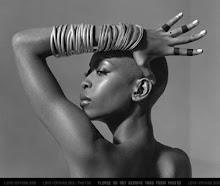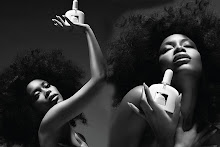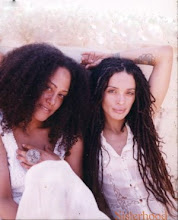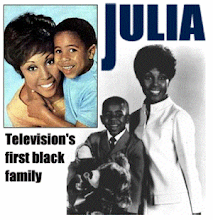
As I come into my naturaldom, I've notice an unwritten, nonverbal tension between women who straighten their hair versus those who wear their hair naturally. If I wasn’t interested in going natural, I don’t think I would have noticed this tension. My contention is that the “straighteners” think the “naturals” are lacking in beauty or the concern with it. Meanwhile the “naturals” are thinking the “straighteners” are lacking in knowledge/love of self. Please correct me if I’m wrong. This is merely my hypothesis. The next piece is taken from a lovely web entry I stumbled across- which sites information from Willie Morrow’s book “400 Hundred Years Without a Comb”- intertwined with my personal thoughts as well.
Our Hairstory:
We come from a continent where our hair was maintained, styled, and adorned based on the customs and traditions of our ancestors. The comb was considered a work of art. Through the designs of the combs, one would be able to tell the owners tribe, his/her rank in the tribe, wealth, history and culture. In fact, grooming and the art of haircare found unique expression in the African society. When forcibly brought over to America, our ancestors had their hand-carved wood combs confiscated because they were seen as potential weapons. To replace this, they were given the fine-toothed European combs that proved useless for their naturally thicker, curlier hair.
Even though our ancestors were violently forced to submit to their new environment, their hair refused to co-operate and didn’t relinquish it’s unique characteristic. In my opinion, this is one of our eternal ties to our ancestors, who we truly are, and who we are destined to become.
In addition to being denied the tool for grooming, under the slavery regime there wasn’t exactly much time allotted for hygiene and beauty.
As a result, our ancestors were condemned to constant scalp diseases and unhealthy hair that fell out in clumps. Female slaves took to wearing a head rag, usually made from discarded grain or feed sacks to cover up head sores and bald spots. They also used the rag to protect their exposed scalps from hovering flies.
At the beginning of the 19th century, slave masters began to allow more time for personal grooming, in order to improve the market value of their “property.” Slaves were given old combs and dull scissors for their hair instead of animal shears. The house slaves were given strict rules for their appearance; men were forced to keep their hair cut extremely short and the women had to keep their hair covered if it was braided, or straightened with a hot iron. When slaves were finally permitted to groom, the goal was to make it long and straight, emulating their “masters.”





















































Again, wow... Great post. Getting that connected to here: http://www.niggasnomore.com/archives/794 is what needs to happen. You know what, I'm going to enable a link feed TODAY so I can link to sites link this.
ReplyDeleteOMG.... let me begin by saying I love the cut. I'm proud that you are so brave. I am still a punk, and although underneath the weaves my hair is 100% natural, im still not brave enough to rock my fro.... Im at the beginning of my evolution so its difficult. But the fact that hair is not what makes you beautiful is important, society forces their notions of beauty on us and its crazy how they have affected us,,, myself included. There was an episode on tyra the other day which saddened me. There was this pretty little black girl with gorgeous thick hair that she hates... she likes only wearing her hannah montana wig because thats how she wishes her hair looked. I think you are not only a beautiful person but an excellent role model for other black women and girls... kudos!!!!
ReplyDeleteThank you for your kind words. I must say that I don't think it takes bravery or courage to wear natural hair. I think once the conscious decision is made in your mind to do so, nothing will stop you. I encourage you to do as much research as possible so that your decision will be a well informed one and not just a fad. It is, if anything, a psychological process (the evolution you mentioned) but "the grass is [definitely] greener on the other side.
ReplyDeleteAbout that little girl on the Tyra Show, my heart goes out to her, as well as her mother. The mother is the one that either encourage (by reinforcing) or discourage that oppressive way of thinking.